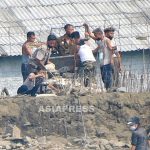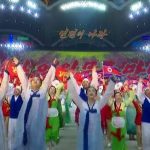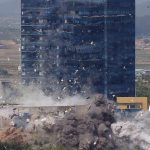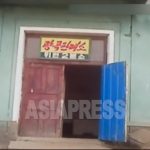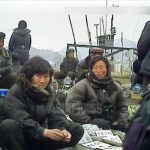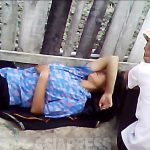Rimjin-gang - Periodic Report 2011-Feb-09

I am the chief editor publisher of Rimjin-gang, Ishimaru Jiro. The Rimjin-gang team has decided to start publishing periodic press releases containing pertinent new information gathered by our reporters in North Korea.
Starting with Kim Dong-cheol, there are currently 8 North Korean reporters or collaborators working with the Rimjin-gang editorial staff to report undercover inside the country. They take video and talk with locals, reporting their findings several times a week via telephone and other means of communication. The latest information presented below is based off these reports.
The latest situation inside North Korea provided by Rimjin-gang reporters is that of dire conditions both for the common people and the military. Based on our report below, we predict that even by mid-February, North Korea will ask the international community for further food aid. Attention will be focused on the world's response.

1. Hyperinflation;
Prices have soared 50 times from their levels a year before, and volatility is very high.
2. Worsening food supplies to the troops;
Civilians and cadres have been ordered to supply food to the army.
==============================================
1. Hyperinflation
We have combined information gained from multiple Asia Press reporting partners in the Northern regions of North Hamkyung and North Pyongan, as well as the central regions of South Pyongan and Pyongyang. While there are small regional pricing differences as well as heavy volatility, at the end of January 1 kilogram of white rice sold for around 2000-2500 won.
 Following the implementation of the November 30, 2009 currency reform (redenomination the currency 100 to 1) the price of rice was set at 44 won. This equates to a 50-fold price increase over a span of less than one year. We can see the heavy toll inflation caused by the currency reform has had on the economy.
Following the implementation of the November 30, 2009 currency reform (redenomination the currency 100 to 1) the price of rice was set at 44 won. This equates to a 50-fold price increase over a span of less than one year. We can see the heavy toll inflation caused by the currency reform has had on the economy.
Since prices of other goods have increased at the same rate, and their prices in real dollar terms have not moved that much, it is clear that inflation is not because of a shortage of food but rather due to the drop in the value of the currency. At this point in time it is unclear whether or not the authorities have increased the issuance of currency.
Here are market prices for various goods at the end of January (1 kilogram unts)
 Corn: 900-950 won
Corn: 900-950 won
Pork: 5,000 won
Gasoline: 5,000 won
1 USD: 2,880-3,000 won
1 RMB: 400-500 won
(won = North Korean won/KPW)
Reports from the common market in Pyongsong, South Pyongan province reveal that it is hard for merchants to set prices. The price of dollars and yuan on the black market is highly volatile, causing interference in trade and a widespread reluctance to sell. In addition, trade in the sharply depreciating North Korean won is coming to a halt. Demands for payment in dollars or yuan are increasing.

The price of goods and foreign currencies have all risen 50% since mid-December last year, so hyperinflation continues. The prices of goods in won are soaring, while in dollar terms they remain basically unchanged from last year. It is clear that there is a severe drop in the value of the won.
According to our reporter Kim, both rice and corn continue to be display in large quantities in the common markets. In other words, North Korea is not suffering from food shortages.
2. Food supplied to the army has drastically decreased
On the other hand, food shortages in the army are very serious. According to a Defense Security Command commissioned officer Kim Dong-cheol met in North Pyongan Province, the amount of food, principally corn, supplied to the troops is being restricted to 300 grams/day.
 "At 100 gram a meal amounts, you will suffer malnourishment just by sitting around." Kim says that the food supplied to the army hasn't been in this low in the last 10 years.
"At 100 gram a meal amounts, you will suffer malnourishment just by sitting around." Kim says that the food supplied to the army hasn't been in this low in the last 10 years.
The Defense Security Command is in charge of protecting Kim Jong-il and other important officials, so it receives better treatment than normal combat squads or construction teams. This officer, an acquaintance of Kim, spoke his mind about the lack of food: "It is only January and the food situation is already this bad. That means that during the spring distress period (the offseason running from April to August, when there are food shortages every year) it will be terrible."
 In the region Kim resides, there have been directives for the residents to supply the army rice for free:"From the beginning of the year, an order came in via the People Unit telling each family to donate 1 kilo of food to the army. In addition, high level cadres from the party and companies were instructed by the central government to unconditionally procure 500 kilos. Large scale market businessmen are also being pressured to provide "patriotic rice" to the army.
In the region Kim resides, there have been directives for the residents to supply the army rice for free:"From the beginning of the year, an order came in via the People Unit telling each family to donate 1 kilo of food to the army. In addition, high level cadres from the party and companies were instructed by the central government to unconditionally procure 500 kilos. Large scale market businessmen are also being pressured to provide "patriotic rice" to the army.
 Today in North Korea, even though food is being trading in the markets, the government is left scraping the bottom of the barrel. Key organizations and facilities like the army, mines, and military supply factories are all suffering massive food distribution problems. As we enter February, there is a high likelihood the government will reach out to the international community for food aid.
Today in North Korea, even though food is being trading in the markets, the government is left scraping the bottom of the barrel. Key organizations and facilities like the army, mines, and military supply factories are all suffering massive food distribution problems. As we enter February, there is a high likelihood the government will reach out to the international community for food aid.

(ISHIMARU Jiro/Chief Editor/Rimjin-gang)
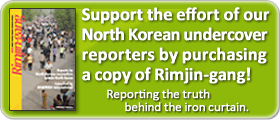
* Editor's notes on North Korean reporters
ALL REPORTS >>>
ARCHIVE(pdf) >>
